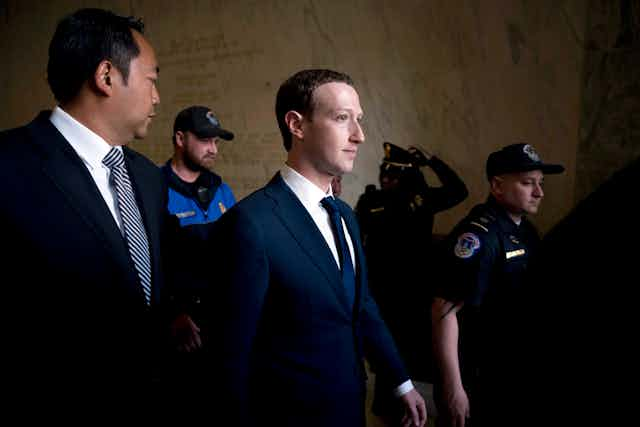The scandal surrounding the improper use of data by Cambridge Analytica and Facebook in the 2016 U.S. election is reminiscent of the old debates about propaganda and its ability to “violate the minds of the masses,” according to Sergei Tchakhotin, an expert in the study of Nazi propaganda.
The Russian sociologist said that the masses were subjected to a sophisticated machinery of manipulation that could, through the strategic use of radio, film and well-orchestrated performances, touch on and influence the basic instincts of Germans.
Decades later, we’re once again back discussing the manipulation of emotions, this time via social media platforms.

Of course, the communication ecosystem is very different from what existed for Joseph Goebbels, Hitler’s propaganda minister. But the underlying principles for manipulating the masses do not seem to have changed much.
Reports indicate that Cambridge Analytica developed a methodology that allowed them to establish psychographic profiles of Facebook users, and thus push emotional buttons that could influence their political preferences and voting behaviour.
To some degree, this represents the return of what’s known as the hypodermic effect in which the audience falls “victim” to powerful media that have the ability to manipulate our emotions and shape our understanding of the world.
Read more: Why we should all cut the Facebook cord. Or should we?
Research, however, indicates that how we respond to media does not adhere to what’s known as a stimulus-response causality. There are other factors that intervene in the way people use, perceive and process what they consume in the media. They are known as “mediations” that, according to the Spanish-Colombian professor Jesús Martín Barbero, are the different ways people interpret the messages conveyed by the media.
Using our data to influence us
But today, governments, corporations and political parties have the unprecedented ability to process a litany of data and then, through sophisticated algorithms, broadcast messages and images to influence an increasingly segmented audience.
One must ask, then, what role will Martín Barbero’s mediations — our cultural references, values, family, friends and other reference groups that influence our reading of the mediated messages — play in how we consume information and entertainment on social networks?
Are we condemned to live the “dystopian realism” presented by the British TV series Black Mirror in which digital media penetrate the intimacy of a human being too clumsy to resist the temptation of being manipulated, according to the show’s creator Charlie Brooker?
Read more: God is an algorithm: why we're closer to a Black Mirror-style reality than we think
The debate about the influence of Facebook and unscrupulous companies like Cambridge Analytica reveals the importance of emotions not only in our private lives but also in our so-called “public lives” as citizens. The problem arises in terms not only of “emotional manipulation” but of the role emotions play in how we relate and understand the world around us.
As the neuroscientist Antonio Damasio recently said:
“Culture works by a system of selection similar to that of genetic selection, except that what is being selected is an instrument that we put into practice. Feelings are an agent in cultural selection. I think that the beauty of the idea is in seeing feelings as motivators, as a surveillance system, and as negotiators.”
If feelings are an integral part of this “cultural selection,” are we facing a shift in this sociocultural evolutionary process due to the “algorithmization” of emotions?
Is historian Yuval Noah Harari right when he says that “technological religion” — he calls it “dataism” — is transforming us in such a way that it will make the homo sapiens irrelevant and put the human being on the periphery in a world dominated by algorithms?
More isolation ahead?
These are complex questions that are difficult to answer.
In any case, it seems that our intellectual or even emotional laziness is transforming us into puppets of our emotions. Evidence is emerging that digital media is changing the configuration of our nervous system and our forms of socialization.
Sherry Turkle, a professor at MIT, observes in her book Alone together: Why we expect more from technology and less from each other that there are already signs of dissatisfaction among young people who are obsessed with their image on social media while losing the ability of introspection; mothers who feel that communication with their children via text messages is more frequent but less substantive; and Facebook users who think that the banalities they share with their “virtual friends” devalue the true intimacy between friends.
If virtual relations replace face-to-face contact, we may see more isolation, individualism and less social cohesion, which does not bode well for the survival of democracy.
It’s also likely that the expansion of social media does not make us more rational. Although we have access to more information and participate in more public debates about issues that affect us as individuals and as a society, that doesn’t mean we’re doing so more rationally or based on arguments that are scientifically factual.
The rise of religious fundamentalism, nationalism, of beliefs in all kinds of sects and New Age fashions are symptoms of a “return of sorcerers” or magical thinking in our digital society.
We deploy our egos on social media, sometimes with a compulsive need for recognition. This knowledge of our self, quantified in big data and transformed into affective algorithms, is exploited by corporations and political parties to give us, as Andy Warhol said, our 15 minutes of fame.
The sorcerers of propaganda are back — this time with more powerful means that their predecessors.

